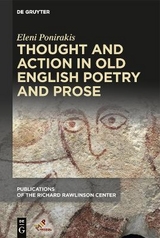Thought and Action in Old English Poetry and Prose
Seiten
2023
De Gruyter (Verlag)
978-1-5015-1852-2 (ISBN)
De Gruyter (Verlag)
978-1-5015-1852-2 (ISBN)
In the burgeoning field of cognitive studies in Anglo-Saxon literature, criticism has tended to focus on the mind in isolation. This book offers a new look at the way authors of Old English poetry and prose explored the intimate relationship between mental and physical acts.
Cognitive approaches to early medieval texts have tended to focus on the mind in isolation. By examining the interplay between mental and physical acts deployed in Old English poetry and prose, this study identifies new patterns and offers new perspectives. In these texts, the performance of right or wrong action is not linked to natural inclination dictated by birth; it is the fruit of right or wrong thinking. The mind consciously directed and controlled is open to external influences, both human and diabolical. This struggle to produce right thought and action reflects an emerging democratization of heroism that crosses societal and gender boundaries, becoming intertwined with socio-political, soteriological, and cultural meaning. In a study of influential prose texts, including the Alfredian translations and the sermons of Ælfric, alongside close readings of three poems from different genres – The Seafarer, The Battle of Maldon, and Juliana –, Ponirakis demonstrates how early medieval authors create patterns of interaction between the mental and the physical. These provide hidden keys to meaning which, once found, unlock new readings of much studied texts. In addition, these patterns of balance, distribution, and opposition, reveal a startling similarity of approach across genre and form, taking the discussion of the early medieval conception of the mind, soul, and emotion, not to mention conventional generic divisions, onto new ground.
Cognitive approaches to early medieval texts have tended to focus on the mind in isolation. By examining the interplay between mental and physical acts deployed in Old English poetry and prose, this study identifies new patterns and offers new perspectives. In these texts, the performance of right or wrong action is not linked to natural inclination dictated by birth; it is the fruit of right or wrong thinking. The mind consciously directed and controlled is open to external influences, both human and diabolical. This struggle to produce right thought and action reflects an emerging democratization of heroism that crosses societal and gender boundaries, becoming intertwined with socio-political, soteriological, and cultural meaning. In a study of influential prose texts, including the Alfredian translations and the sermons of Ælfric, alongside close readings of three poems from different genres – The Seafarer, The Battle of Maldon, and Juliana –, Ponirakis demonstrates how early medieval authors create patterns of interaction between the mental and the physical. These provide hidden keys to meaning which, once found, unlock new readings of much studied texts. In addition, these patterns of balance, distribution, and opposition, reveal a startling similarity of approach across genre and form, taking the discussion of the early medieval conception of the mind, soul, and emotion, not to mention conventional generic divisions, onto new ground.
Eleni Ponirakis is a researcher in Old English and Old Norse language and literature. She teaches medieval studies at University College London (UCL) and at the University of Reading. She is Honorary Research Fellow at the University of Nottingham.
Acknowledgements
Notes on Editions
Abbreviations
Introduction
Mental and Physical Acts in the Alfredian Translations, the Sermons of Ælfric, and the Old English Benedictine Rule
Body and Soul: Thought and Action in The Seafarer
A New Kind of Hero? Thought and Action inThe Battle of Maldon
A State of Mind: Byrhtnoð and Maldon in the Context of Æðelred's Eard
The Devil's Lar: Mental Manipulation in Juliana
Conclusion
Bibliography
Index
| Erscheinungsdatum | 21.08.2019 |
|---|---|
| Reihe/Serie | Richard Rawlinson Center Series for Anglo-Saxon Studies |
| Zusatzinfo | 4 Tables, black and white |
| Verlagsort | New York |
| Sprache | englisch |
| Maße | 155 x 230 mm |
| Gewicht | 425 g |
| Themenwelt | Sachbuch/Ratgeber ► Gesundheit / Leben / Psychologie ► Esoterik / Spiritualität |
| Geschichte ► Allgemeine Geschichte ► Mittelalter | |
| Geisteswissenschaften ► Philosophie ► Philosophie des Mittelalters | |
| Geisteswissenschaften ► Sprach- / Literaturwissenschaft ► Anglistik / Amerikanistik | |
| Geisteswissenschaften ► Sprach- / Literaturwissenschaft ► Literaturwissenschaft | |
| Schlagworte | Angelsächsisch • Bewegung • Emotion • Stillstand • Verstand |
| ISBN-10 | 1-5015-1852-6 / 1501518526 |
| ISBN-13 | 978-1-5015-1852-2 / 9781501518522 |
| Zustand | Neuware |
| Haben Sie eine Frage zum Produkt? |
Mehr entdecken
aus dem Bereich
aus dem Bereich
eine neue Geschichte des Mittelalters
Buch | Hardcover (2023)
C.H.Beck (Verlag)
CHF 53,20




